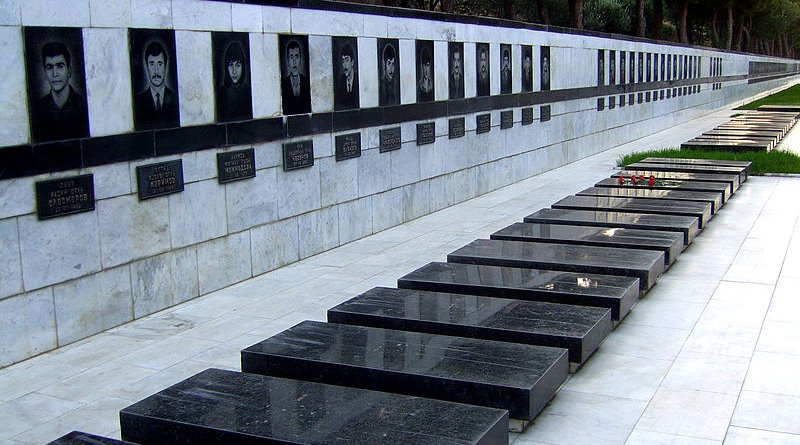Azerbaijan Pays Homage To ‘Black January’ Martyrs – OpEd
Every year on Jan. 20, Azerbaijanis all over the world commemorate the sacrifices made by Azerbaijani heroes in a tragic event known as “Black January”, which ultimately led to the independence of Azerbaijan from the Soviet Union on Oct. 18, 1991.
Thousands of people in Baku marched to the Alley of Martyrs on Jan. 20 to pay their homage to their fallen heroes.
“This year, we are commemorating the 30th anniversary of Black January. We will never forget our heroes who sacrificed their lives for our independence,” Azerbaijan Ambassador to Indonesia Jalal Mirzayev said during a commemoration event of Black January at an orphanage in Jakarta on Jan. 18.
What were the sacrifices made by Azerbaijani freedom fighters? Why is it called “Black January”?
Before answering these questions, we must know that Azerbaijan, an energy-rich country in the South Caucasus, is a Muslim-majority country. It was part of the Soviet Union from 1920 to 1991.
Soviet leaders in the late 1980s, favored Christian-majority Armenia, another Soviet Republic, and showed discrimination against the Azerbaijani people, mainly Muslims. They even encouraged Armenians to expel 300,000 Azerbaijanis from Armenian territories during the period from 1988 to 1989.
With Soviet support, Armenian troops occupied some of Azerbaijan’s territories by force, mainly Nagorno-Karabakh and its adjacent area. In that process, several thousands of Azerbaijanis were killed and almost a million people became refugees or internally displaced persons.
In Baku, people were protesting against the discriminative policies of the Soviet Union and the brutal acts of Armenia against the Azerbaijani people for several days in January 1990. People also began demanding independence from the Soviet regime.
Under the leadership of Mikhail Gorbachev, the Soviet Union decided to crush Azerbaijani protests and deployed 26,000 troops to Baku without consulting or informing the administration of the then-Azerbaijan Republic.
Soviet troops imposed a media blackout and a curfew in the city on Jan. 20. The invasion of Baku began on the night of Jan. 19 and continued until the evening of Jan. 20. People did not really know that there was a curfew. Thousands of people were protesting in the streets in Baku on Jan. 20.
Soviet troops mercilessly opened fire on unarmed people, and their tanks fired at apartments and even ambulances.
“It was a massacre in which children, women and elderly people were killed. The tragedy of Jan. 20 was engraved in the history of Azerbaijan as ‘Black January’,” Ambassador Jalal told this author.
According to Jalal, there were also demonstrations in cities like Sumgayit and Lankaran on Jan 20. Soviet troops also opened fire on protesters in these cities and killed several people.
Though it was a tragedy, Black January inspired thousands of Azeraijanis to intensify their freedom struggle against the brutal regime of the Soviet Union.
“The violent suppression brought a 70-year-old Soviet rule in Azerbaijan to an end and led to the restoration of Azerbaijan’s independence,” Jalal said.
The Azerbaijani people proclaimed their independence by establishing the Azerbaijan Democratic Republic, the first one of its kind in the Muslim East, on May 28, 1918. But it lasted for only 23 months when Bolsheviks invaded Azerbaijan in 1920.
The Black January massacre was strongly condemned by the Azerbaijani people, especially their national leader Heydar Aliyev, who resigned from the Communist Party of the Soviet Union in 1991 in protest.
The Human Rights Watch issued a report condemning Black January. The report mentioned the tragedy in these words:
“Indeed, the violence used by the Soviet Army on the night of January 19-20 was so out of proportion to the resistance offered by Azerbaijanis as to constitute an exercise in collective punishment. Since Soviet officials have stated publicly that the purpose of the intervention of the Soviet troops was to prevent the ouster of the Communist-dominated government of the Republic of Azerbaijan by the nationalist-minded, non-Communist opposition, the punishment inflicted on Baku by Soviet soldiers may have been intended as a warning to nationalists, not only in Azerbaijan, but also in other Republics of the Soviet Union”.
The report also documented how Soviet soldiers intentionally ran down and crushed unarmed people under their tanks. It also stated how a civilian bus was attacked by Soviet troops who killed the bus driver and several passengers. They attacked hospitals, ambulances and medical personnel assisting the injured people and stabbed unarmed people to death with their bayonets.
The shameless Soviet Union leadership defended their acts of brutality in Baku by branding Azerbaijani freedom fighters as armed hooligans and drug-traffickers.
Unfortunately, the perpetrators of Black January were never brought to justice as the Soviet Union dismantled all the evidence. Many people suspect that Armenia played a role in the Black January massacre.
First, most of the troops that took part in the Black January massacre had just returned from Afghanistan. Some of them were soldiers from Armenia.
Second, Gorbachev had advisers like Aganbegyan and Shagnazarov Tsitarvan from Armenia at that time.
The Soviet Union wanted to teach a lesson to all other Republics that were demanding independence by crushing Baku protests. But it failed in its mission and finally, the Soviet Union was collapsed in 1991.
Even after 30 years, the Azerbaijani people still remember Black January martyrs and their sacrifices.
“Black January was a major turning point in our history. It gave us sorrow but also dignity, courage and pride. And finally, the most precious one – freedom. Our martyrs, who sacrificed their blood for our lovely country, will always remain in our hearts,” Jalal said.

